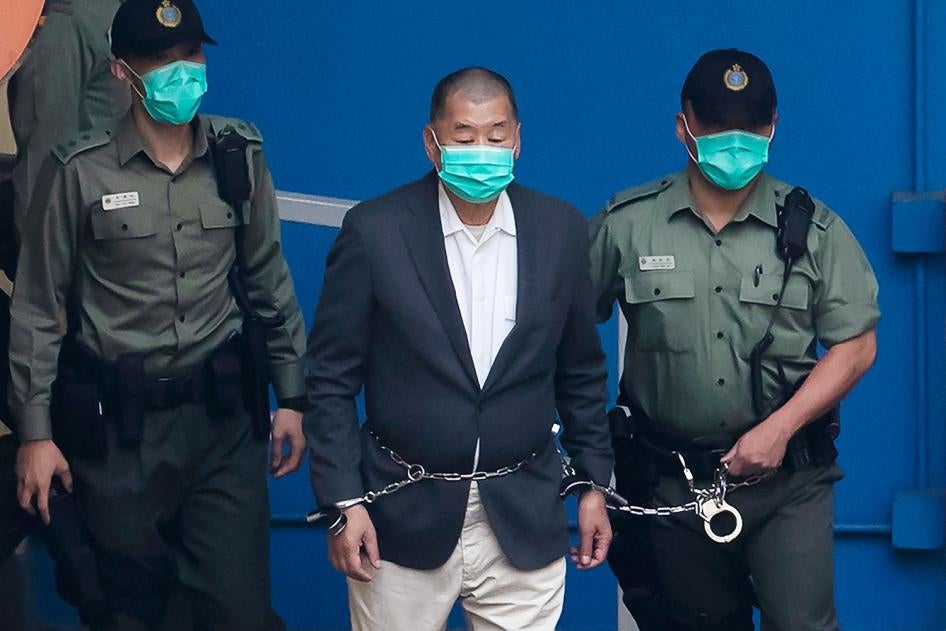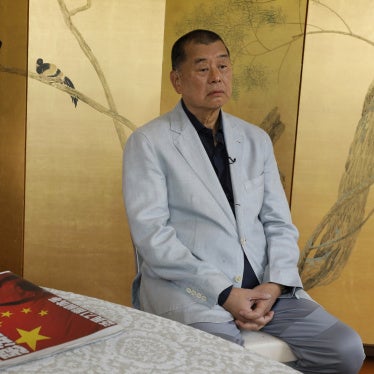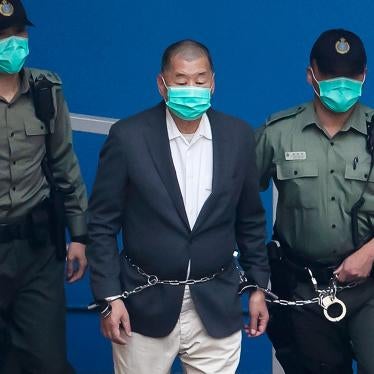Update: On December 13, 2022, the High Court adjourned the trial of Jimmy Lai until September 25, 2023.
(New York) – The authorities in Hong Kong should immediately drop the baseless charges against Jimmy Lai, the pro-democracy media tycoon, and unconditionally release him and his six co-defendants, Human Rights Watch said today. Lai’s trial is scheduled to resume on December 13, 2022.
Hong Kong authorities have called on the Chinese government to change Hong Kong law to bar foreign lawyers from national security cases, denying Lai’s right to a lawyer of his choosing, and have threatened to try him in mainland China, where the courts are beholden to the Chinese Communist Party. He and the six co-defendants, who pleaded guilty to one charge, face up to life in prison.
“Beijing seems intent on imprisoning one of its most powerful critics for many years, possibly for the rest of his life,” said Maya Wang, associate Asia director at Human Rights Watch. “The authorities should drop their bogus charges against Jimmy Lai and free him and his six co-defendants.”
Lai, 75, was the first person to be charged with “collusion with foreign forces” under the draconian National Security Law (NSL), which the Chinese government imposed on Hong Kong in June 2020. Lai faces three foreign collusion charges and a sedition charge, based on his tweets, interviews he hosted, and articles published by his newspaper, Apple Daily.
In addition to the national security charges, Lai was convicted in three cases of “unauthorized assembly” in April, May, and December 2021 for participating in peaceful protests and sentenced to 20 months in prison. He was also convicted on two “fraud” charges in October 2022 for alleged lease violations by his media company and sentenced to another 5 years and 9 months in prison. He has been serving his sentences since April 2021.
Lai’s trial has already been marred by serious violations of his fair trial rights:
- Right to legal counsel: In October 2022, the Hong Kong High Court approved Lai’s application to be represented by British Senior Barrister Timothy Owen. The Department of Justice appealed the decision but lost in the Court of Appeal and the Final Court of Appeal. Hong Kong Chief Executive John Lee then said he would ask the central Chinese government to intervene by “interpreting” Hong Kong’s de facto constitution, the Basic Law, to bar overseas lawyers from representing national security defendants. A top Hong Kong official further suggested that if Lai did not find a Hong Kong lawyer to represent him, he could be tried in China, where few procedural protections exist.
- Prolonged pretrial detention: The NSL denies bail to suspects unless the judge is convinced they will not commit national security offenses. Lai has been detained since December 2020, when he was charged under the NSL. The law’s presumption against bail without regard to the seriousness or nature of the alleged offenses is inconsistent with the presumption in favor of bail and presumption of innocence in Hong Kong’s common law tradition and under the International Covenant on Civil and Political Rights. Both are incorporated into Hong Kong’s legal framework via the Basic Law and expressed in the Bill of Rights Ordinance.
- Non-jury trial: In accordance with the NSL, the prosecution ordered a no-jury trial for Lai’s case, a departure from tradition for High Court criminal trials. The United Nations Human Rights Committee, in its General Comment No. 32 on the right to a fair trial, has stated that if “exceptional criminal procedures or specially constituted courts or tribunals [such as non-jury trials] apply in the determination of certain categories of cases, objective and reasonable grounds must be provided to justify the distinction.”
- Handpicked judges: Three judges selected by the Hong Kong chief executive, who was selected by Beijing, will preside over the case.
Media reports say that the prosecution’s supposed evidence of “foreign collusion” against Lai consisted of his tweets seeking attention from foreign politicians, a meeting with the then-US secretary of state, and a talk show he hosted on Apple Daily’s digital platform on which he interviewed foreign politicians. Other ostensible evidence includes publishing an English version of Apple Daily, and his calls on foreign governments and politicians to support Hong Kong’s 2019 protests and to sanction Hong Kong officials for rights violations.
The prosecution alleged that these “communication[s] with external elements” between April 2019 and June 2021, some of which took place before the NSL came into effect, showed Lai was a “mastermind” in foreign collusion,” signaling a possible harsh sentence. None of the activities or speech cited espoused violence or other behavior that would constitute a recognizable crime under international law.
As evidence of “sedition,” the prosecution claimed that 160 articles published by the Apple Daily between 2019 and 2020, including op-eds written by pro-democracy politicians and activists, called on people to protest, “incited hatred against the police,” and “promoted the use of violent methods to resist the central Chinese government.” But it is unclear which articles the prosecution is using to substantiate these allegations.
In November 2022, Lai’s six co-defendants pleaded guilty to the charge of “conspiring” with Lai to “commit collusion with foreign forces.” The six are: Cheung Kim-hung, former chief executive of Next Digital, parent company of Apple Daily; Chan Pui-man, Apple Daily’s former associate publisher; Ryan Law Wai-kwong, former editor-in-chief; Lam Man-chung, former executive editor-in-chief; Fung Wai-kong, former executive editor-in-chief of the English news section; and Yeung Ching-kee, former editorial writer. The date for their mitigation hearing for the conspiring charge has not yet been set. Some of them will testify in Lai’s trial and their sentence will be handed down after the case concludes.
“The Chinese and Hong Kong governments’ maneuvers to bar foreign counsel from national security cases will further undermine the rule of law in the city, which has dropped precipitously since the National Security Law was imposed,” Wang said.
China’s top legislative body, the Standing Committee of the National People's Congress (NPCSC), is expected to “interpret” the Basic Law during its next bimonthly session in late December, though the Standing Committee’s December agenda does not include such an item. If it does this, it will be the seventh time the Standing Committee has done so since Hong Kong’s transfer from British to Chinese control in 1997. Three of these seven decisions (in 2004, 2016, and 2020) eroded and eventually ended Hong Kong’s semi-democratic governance. The 2016 decision, when the Standing Committee disqualified two pro-independence politicians, and the upcoming decision involve Beijing’s direct interference in ongoing court cases in Hong Kong.
The Standing Committee’s decision will also further damage the independence of lawyers in Hong Kong and make it even harder for those in political trials to exercise their right to legal counsel. Some Hong Kong lawyers previously representing arrested protesters have left the city following the imposition of the NSL. Chinese and Hong Kong authorities’ high-profile harassment of the Hong Kong Bar Association’s former chairperson, Paul Harris, contributed to the intimidating environment. Barring defendants in national security cases from having foreign counsel will leave them with few or no Hong Kong-based lawyers willing to take their cases. Defendants would either have to hire lawyers compliant with Beijing’s demands, or risk being transferred to China and the Beijing-controlled legal system.
The significance of the Jimmy Lai case extends beyond Hong Kong, Human Rights Watch said. The Chinese government controls all Chinese language media in the mainland, along with the internet. Since 2020, the Chinese and Hong Kong governments have dismantled Hong Kong’s once-thriving independent press, which for decades had often been highly critical of the Chinese Communist Party. Hong Kong police raided and shuttered Apple Daily, along with another influential outlet, Stand News; at least seven other outlets shut down in fear of the crackdown. Now there are few alternative, independent Chinese language information sources for Chinese language speakers outside of Beijing’s control.
“Concerned governments should press Beijing to drop all charges against Lai,” Wang said. “The Chinese government’s assault on Hong Kong’s rule of law and free media present a global threat.”








